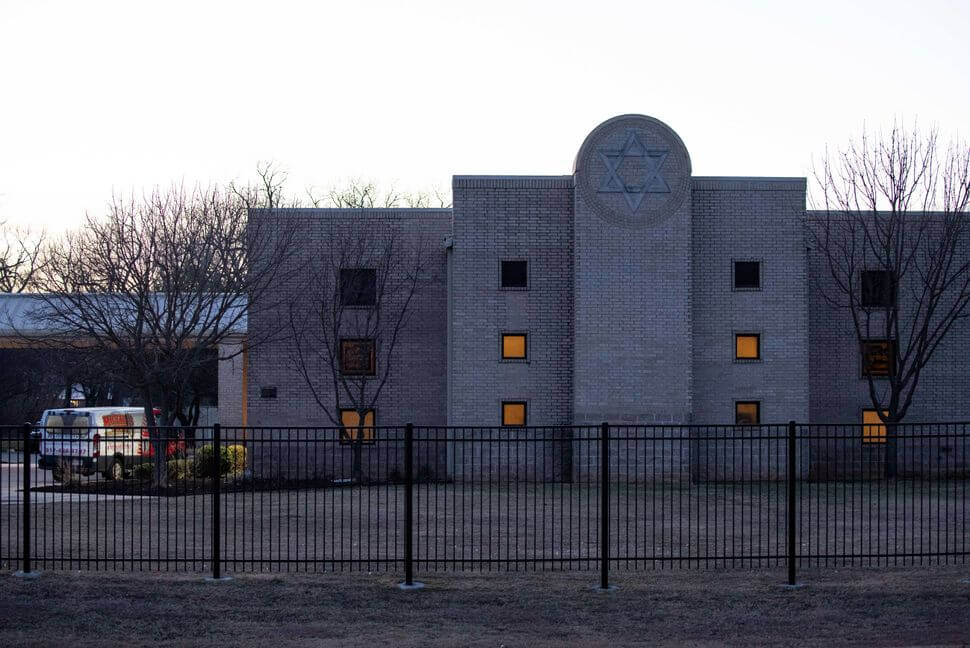After Texas synagogue siege, rabbis wonder: welcome the stranger, or lock the doors?
For some American rabbis, ‘being a fortress is not in the cards.’

Congregation Beth Israel synagogue in Colleyville, Texas. A 44-year-old British national over the weekend stormed into the synagogue with a gun and held four people hostage for more than 10 hours. Photo by By Emil Lippe/Getty Images
FLOWER MOUND, Texas – The hostage standoff at Congregation Beth Israel might never have happened if Rabbi Charlie Cytron-Walker had not welcomed in a man who claimed to be looking for shelter on a cold Saturday morning.
But the desire to help is hard to turn off for many rabbis, who strive to fulfill the Biblical imperatives of welcoming the stranger and assisting the needy.
Geoffrey Dennis, rabbi of nearby Congregation Kol Ami, said he understood Cytron-Walker’s impulse to let the man in.
“I would have done exactly the same thing,” said Dennis.
But has that calculus changed since Saturday?
“That’s a good question,” he said. “I haven’t decided.”
In the aftermath of the 11-hour standoff in Colleyville, rabbis across the country are revisiting a question as old as Judaism: how to balance the core Jewish values of hospitality and charity with very real concerns about safety.
The question has special resonance for Cytron-Walker’s Jewish colleagues, clergy and lay leaders who minister to small communities in the sprawling suburbs around Dallas and Fort Worth — and who have smaller security budgets than large urban synagogues.
“Everybody’s a little bit paranoid right now,” said Rabbi Levi Gurevitch on Sunday, as he let a reporter into Chabad of Southlake, the nearest synagogue to Beth Israel, and locked the door behind him.
At Kol Ami, security cameras ring the driveway and the front doors are securely locked. But the building, a former Lutheran church, is not fenced and a long row of windows look out on the parking lot. Dennis said the windows let him and the officer manager keep an eye on who is coming and going from the synagogue, but he acknowledged they could be seen as a liability.
“Being a fortress is not in the cards,” Dennis said. “We intend to be open to the world, we want to be a light unto the nations.”

Rabbi Geoffrey Dennis of Congregation Kol Ami. By Arno Rosenfeld
Russ Schultz, president of Beth El in Fort Worth, a congregation more than twice the size of Beth Israel, said the synagogue has armed guards at all its services. The building is also closed to the public, and visitors have to be admitted by staff.
But Schultz acknowledged that this higher level of security is not impenetrable. Nor does it feel adequately safe to everyone: He attributed a precipitous drop in Sunday’s Hebrew school attendance to the fear many of his fellow congregants were feeling.
“Being a Jew today, you’re walking on the edge of the plank and just hoping nobody pushes,” he said. “But you’re up there on the plank.”
Rabbi Ben Sternman, who leads Adat Chaverim in Plano, said his congregation’s doors are locked except for the time immediately before services, when two greeters are present at the door, backed up by a police officer stationed inside. The approach is intended to offer a friendly face to newcomers while ensuring there is backup in case something goes wrong. The balance, he acknowledged, remains difficult, especially as people with mental health issues can gravitate toward places of worship.
“How do you welcome people who are in need and are just in need?” he said. “It’s really hard.”
The difficulty of welcoming the stranger is as old as the Jewish value itself. In the Book of Genesis, Abraham, then 99 years old and recovering from circumcision, rises and — Scripture tells us — runs to greet three foreign travelers.
Today’s clergy, no matter where they are in the country, face the challenge of squaring the commandment — eventually given directly in the Book of Exodus — with what Los Angeles Rabbi Yoshi Zweiback calls the need to “not be naive.”
Zweiback, who leads Stephen Wise Temple, a large Reform synagogue across town from Ikar, could recall two instances when a guest exhibiting strange behavior had come to a previous synagogue where he was working. In both cases, security guards helped assess the visitor’s risk, the person was not a threat, and the rabbi was able to render hospitality.
In his view, pikuach nefesh — the principle of preserving human life — trumps the value of being a warm and welcoming community.
“It doesn’t mean that we shouldn’t attempt that, or that we should give up on that,” Zweiback said. “It just means that we have to default to a position of making sure that we’re safe and secure.”
The rabbi acknowledged that the default position was one that Wise, one of the largest synagogues in the country by membership, could comfortably afford.
Yet erring on the side of caution was not a universal philosophy even at synagogues with robust security.
Rabbi Sharon Brous, head of Ikar, a non-denominational synagogue in Los Angeles, said she had come to live with the tension that “sometimes having our doors open and having our hearts open means that we will get hurt.”
Ikar, which has a membership of hundreds of families, employs armed guards. But Brous said the appropriate response to heightened feelings of vulnerability is to, like Abraham, emphasize the commandment he embodied — even when it gets harder.
That put her in league with Cytron-Walker, whose response to Saturday’s unexpected visitor Brous said she strongly identified with.
“Any time you open your doors, there’s a risk,” she said. “And, to not open your doors also poses a risk. That is a kind of spiritual danger that I’m not willing to risk for our community.”

















